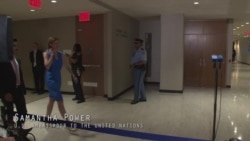The U.N. Security Council discussed homosexual and transgender issues for the first time at an informal meeting on Monday.
The United States and Chile co-sponsored the session, which focused on how LGBT persons in the Middle East are increasingly the target of self-styled Islamic State fighters.
U.S. Ambassador Samantha Power told reporters outside the closed session that it was about time the Council discussed this issue.
“It’s historic,” she said. “Seventy years after the creation of the U.N. that the fate of LGBT persons who fear for their lives around the world is taking center stage.”
Ambassador Power said that while the meeting focused on Islamic State persecution of LGBT persons, it was not limited to it.
“You have countries that have criminalized LGBT status,” she said. “You have societies, of course, that are every bit as unwelcoming as they were 20, 30 years ago.”
According to the U.N. Office of Human Rights, at least 76 countries still criminalize same-sex consensual relations, and in at least five countries, conviction may carry the death penalty.
U.N. Deputy Secretary-General Jan Eliasson said on his way into the meeting that it is important to see what is happening to suppressed minorities.
“This is one, and it’s important we point to the equality of human beings and that we stand up for that principle, always,” he said.
Diplomats said that of the 15 Council members two - Chad and Angola - did not attend the meeting. China, Russia, Nigeria and Malaysia did attend, but did not speak during the session.
Jessica Stern, executive director of the International Gay and Lesbian Human Rights Commission, told the Council that IS fighters have claimed responsibility for the executions of at least 30 gays in Iraq and Syria. She said fear of Islamic State also has fueled violence against LGBT persons by other militias and private actors.
Testimony
Two gay Arab men testified before Council members. One, who went by the pseudonym “Adnan,” spoke by phone from the region. The other, Subhi Nahas, has been resettled in the United States and he testified in person.
Nahas, who is from the northwestern Syrian city of Idlib, told the Council that he lived in fear once his town fell to the al-Qaida affiliate Jubhat al-Nusra in 2012, and it began targeting homosexuals.
By 2014, Idlib fell into Islamic State’s hands. Nahas had seen videos of homosexuals being thrown from rooftops to their deaths and if they survived being stoned to death.
"This was to be my fate, too," Nahas told the closed-door informal meeting.
"I was terrified to go out. Nor was my home safe, as my father, who suspiciously monitored my every move, had learned I was gay. I bear a scar on my chin as a token of his rage," he said, according to a text of his prepared remarks.
Terrified, Nahas fled to Lebanon, then made his way to Turkey. There he received death threats from an old school friend who had joined IS.
Three months ago, Nahas received asylum and was resettled in the United States. He urged Council members not to abandon other LGBT refugees.
Nahas now works with the Organization for Refuge, Asylum, and Migration to help governments and refugee agencies build their capacity to protect LGBT refugees.
"Adnan" told the Council his story by telephone from an undisclosed location, as he said he was still not safe.
"In my society, being gay means death and when [Islamic State] kills gays most people are happy because they think we are evil, and [Islamic State] gets a good credit for that," he said, according to his prepared remarks.
"My own family turned against me when [Islamic State] was after me," he said. "If [Islamic State] didn't get me, members of my family would have done it."
Adnan said Islamic State militants hunt down gay people through cell phone and Facebook contacts of people they capture.
Some information for this report provided by Reuters.













